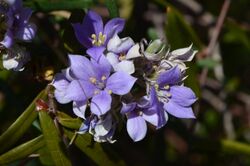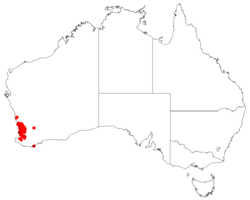Biology:Billardiera fraseri
| Billardiera fraseri | |
|---|---|

| |
| In Kensington Bushland | |
| Scientific classification | |
| Kingdom: | Plantae |
| Clade: | Tracheophytes |
| Clade: | Angiosperms |
| Clade: | Eudicots |
| Clade: | Asterids |
| Order: | Apiales |
| Family: | Pittosporaceae |
| Genus: | Billardiera |
| Species: | B. fraseri
|
| Binomial name | |
| Billardiera fraseri (Hook.) L.W.Cayzer, Crisp & I.Telford[1]
| |

| |
| Occurrence data from AVH | |
| Synonyms[1] | |
| |
Billardiera fraseri, commonly known as elegant pronaya,[2] is a species of flowering plant in the family Pittosporaceae and is endemic to the south-west of Western Australia. It is a climber with densely silky-hairy new shoots, leaves and flowers, narrowly elliptic leaves and deep purple or pink flowers arranged in groups.
Description
Billardiera fraseri is a climber with densely silky-hairy new shoots, leaves and flowers. The adult leaves are narrowly elliptic with the edges turned down, 22–28 mm (0.87–1.10 in) long and 3–5 mm (0.12–0.20 in) wide and sessile. The flowers are arranged in sessile groups with leaf-like bracts 7–9 mm (0.28–0.35 in) long at the base. The sepals are narrowly triangular, 6–12 mm (0.24–0.47 in) long and the petals are deep purple or pink, fading as they age, 12–16 mm (0.47–0.63 in) long and spatula-shaped. Flowering occurs from December to February and the mature fruit is a cylinderical berry about 20 mm (0.79 in) long.[2][3]
Taxonomy
Elegant pronaya was first formally described in 1836 by William Jackson Hooker who gave it the name Spiranthera fraseri in the Botanical Magazine from specimens collected in the Swan River Colony by Charles Fraser.[4][5] In 2004, Lindy Cayzer, Michael Crisp and Ian Telford transferred the species to Ballardiera as B. fraseri in Australian Systematic Botany.[6] The specific epithet (fraseri) honours the collector of the type specimen.[7]
Distribution and habitat
Billardiera fraseri grows on the coastal plain and cliffs on limestone, sand and gravel from near Yanchep and Muchea to North Bannister in the Avon Wheatbelt, Geraldton Sandplains, Jarrah Forest and Swan Coastal Plain bioregions of south-western Western Australia.[2][3]
References
- ↑ 1.0 1.1 "Billardiera fraseri". https://biodiversity.org.au/nsl/services/apc-format/display/156610. Retrieved 2 June 2023.
- ↑ 2.0 2.1 2.2 "Billardiera fraseri". FloraBase. Western Australian Government Department of Parks and Wildlife. https://florabase.dpaw.wa.gov.au/browse/profile/25788.
- ↑ 3.0 3.1 "Billardiera fraseri". Australian Biological Resources Study, Department of Agriculture, Water and the Environment: Canberra. https://profiles.ala.org.au/opus/foa/profile/Billardiera%20fraseri.
- ↑ "Spiranthera fraseri". APNI. https://id.biodiversity.org.au/instance/apni/505801.
- ↑ Hooker, William J. (1836). "Spiranthera fraseri". Curtis's Botanical Magazine 63: 3523. https://www.biodiversitylibrary.org/item/14342#page/208/mode/1up. Retrieved 2 June 2023.
- ↑ "Billardiera fraseri". APNI. https://id.biodiversity.org.au/instance/apni/589233.
- ↑ Sharr, Francis Aubi; George, Alex (2019). Western Australian Plant Names and Their Meanings (3rd ed.). Kardinya, WA: Four Gables Press. p. 202. ISBN 9780958034180.
External links
- Bennett, E.M. 1972. "New taxa and new combinations in Western Australian Pittosporaceae". Nuytsia 1 (3): 266–269. https://biodiversitylibrary.org/page/53146365.
- Bennett, E.M. 1978. "New taxa and new combinations in Australian Pittosporaceae". Nuytsia 2 (4): 184–189. https://biodiversitylibrary.org/page/53140404.
- Billardiera fraseri at The Plant List
- Billardiera fraseri at Tropicos
Wikidata ☰ Q15589217 entry
 |

